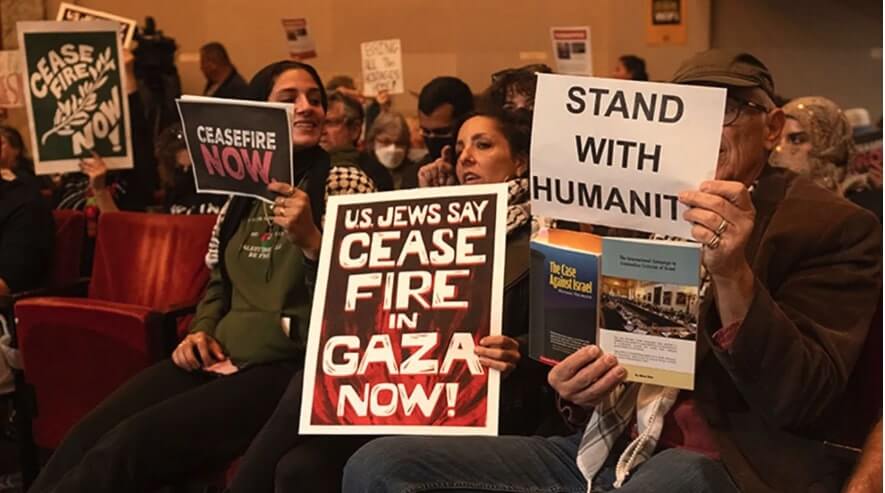Why my Sonoma County synagogue stands for a ceasefire in Gaza
“Before issuing the statement we were — like many Jews and Jewish institutions — tongue-tied,” its rabbi writes.

Supporters of a resolution calling for a ceasefire in Gaza at an Oakland City Council meeting, Nov. 27, 2023. Photo by Aaron Levy-Wolins/J. The Jewish News of Northern California
This piece originally appeared in J. The Jewish News of Northern California
In mid-June, the members of Congregation Ner Shalom of Cotati in Sonoma County issued a statement in support of a ceasefire in the Gaza war.
I want to share a little about the statement and its process because a synagogue issuing a ceasefire statement is still a curiosity to many. It feels less radical now than it would have five months ago, but it required a great deal of thought — and some courage.
In our statement, we speak about the death toll in Gaza, as well as our desire for Jewish safety. We identify specific Jewish values that impel us to speak out. We call for a permanent bilateral ceasefire, the return of hostages and increased humanitarian aid for the people of Gaza. We write from the heart, without jargon or political shorthand.
‘Caught in the middle’
Before issuing the statement we were — like many Jews and Jewish institutions — tongue-tied. Our hearts were heavy from the violence of Oct. 7, the ongoing plight of the hostages and the astonishing number of deaths in Gaza. So many of those deaths have been civilians, and so many of those civilians have been children. With shock, we watched the unfolding starvation in Gaza.
In response to all of this, one might have expected advocates on all sides to band together like never before to call loudly and forcefully for a halt in the fighting, so that Israelis, Palestinians and people everywhere who care about them could catch our collective breath, grieve and figure out what to do next.
Instead, advocacy groups staked out their turf and asked us all to join them on it. On one side, if we didn’t stand with Israel unconditionally, then we were giving aid and comfort to Hamas and aiding and abetting antisemites. On the other side, if we didn’t disavow Zionism immediately and fully, we were complicit in genocide. These messages weren’t always explicit, but this is how it felt to me and to many members of my congregation: We were caught in the middle.
It was certainly more than enough to keep one silent.
‘Who we are as Jews is at stake’
But we realized we didn’t need to sign onto anyone else’s demands to express our grief, our concern and our tattered hope. We decided we could speak together as caring humans, as people of conscience, as Jews and as people who against all odds maintain a commitment to a peaceful and secure future for Jews and Palestinians in the land. We knew we could assert simply that, no matter what the ideology, the violence must stop.
We worked hard on language. We listened to our hearts, to our sadness. We responded to the suffering we are seeing. We offered no specific policy proposal for the future but as we said in the statement, “We are clear that all futures worth having pass through the portal of immediate and permanent ceasefire.”
Some may read our statement and feel that we were too harsh on Israel. Indeed, we were mostly speaking to Israel. This is because we are Jews and, thus, Israel is our sphere of concern, connection and responsibility. Violence enacted upon Israel affects us, and so does violence enacted by Israel. Who we are as Jews is at stake.
As we say in the statement, “The death toll in Gaza has not brought back the hostages, but it has caused unspeakable suffering, undermined Israel’s moral standing, and wounded the collective Jewish soul.”
We knew that no words would be perfect or complete. But we knew our words had to be honest, and I think we achieved that. The statement was approved unanimously by the board, with the near-unanimous support of our membership.
We have made this statement public not only to raise our voice and cast a vote for peace, but to encourage other synagogue communities that feel at a loss to consider what they can say together. We do not want to look back and feel like we were silent. I suspect you feel the same.
You can read the full statement at nershalom.org/ceasefire.
May the ripples of pain and suffering soon cease.
This piece originally appeared in J. The Jewish News of Northern California
A message from our CEO & publisher Rachel Fishman Feddersen
I hope you appreciated this article. Before you go, I’d like to ask you to please support the Forward’s award-winning, nonprofit journalism during this critical time.
We’ve set a goal to raise $260,000 by December 31. That’s an ambitious goal, but one that will give us the resources we need to invest in the high quality news, opinion, analysis and cultural coverage that isn’t available anywhere else.
If you feel inspired to make an impact, now is the time to give something back. Join us as a member at your most generous level.
— Rachel Fishman Feddersen, Publisher and CEO